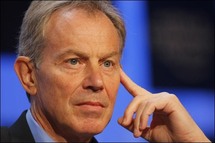
Middle East envoy and former British Prime Minister, Tony Blair
Blair said he understands Netanyahu wants to maintain the blockade insofar as it prevents arms from entering the radical Hamas-run enclave that borders Israel in the north and east, and Egypt in the south.
"But everything else should be able to come in for daily life for the ordinary aspects of proper living for people in Gaza. So you would move from a permitted list of items to then a prohibited list," he said.
"Things go in unless it's on a prohibited list. If we get that changed, that's a big step forward. We can add to that in respect to things like cement and steel piping and other things necessary for construction," he said.
"The construction material goes in, but goes in for the designated United Nations projects of reconstruction," he added.
Israel has been leery of allowing cement and other material in for fear Hamas might use it for military purposes.
When Blair was asked whether Israel would agree to international supervision of Gaza's border to ensure passage of humanitarian goods, Blair replied: "There is a case for an international presence."
He referred only to Gaza's border with Egypt along the so-called Rafah crossing.
"The European Union used to have a presence at the Rafah crossing, and that could be reinstated... The proper Palestinian Authority could be given a role again at the crossings," Blair said.
"I think Israel is open to looking at both of those issues," he said.
Blair later discussed the situation in Gaza and the broader Arab-Israeli peace process with US Secretary of State Hillary Clinton.
The easing of the blockade was welcomed both by Blair, who called it "a good step forward" for the people of Gaza, and a spokesman for Clinton, Mark Toner, who welcomed the "general principles" of Israel's plan.
Under the plan, Israel would "liberalize the system by which civilian goods enter Gaza (and) expand the inflow of materials for civilian projects that are under international supervision," a brief government statement said.
-------------------------------------------------------------------------
"But everything else should be able to come in for daily life for the ordinary aspects of proper living for people in Gaza. So you would move from a permitted list of items to then a prohibited list," he said.
"Things go in unless it's on a prohibited list. If we get that changed, that's a big step forward. We can add to that in respect to things like cement and steel piping and other things necessary for construction," he said.
"The construction material goes in, but goes in for the designated United Nations projects of reconstruction," he added.
Israel has been leery of allowing cement and other material in for fear Hamas might use it for military purposes.
When Blair was asked whether Israel would agree to international supervision of Gaza's border to ensure passage of humanitarian goods, Blair replied: "There is a case for an international presence."
He referred only to Gaza's border with Egypt along the so-called Rafah crossing.
"The European Union used to have a presence at the Rafah crossing, and that could be reinstated... The proper Palestinian Authority could be given a role again at the crossings," Blair said.
"I think Israel is open to looking at both of those issues," he said.
Blair later discussed the situation in Gaza and the broader Arab-Israeli peace process with US Secretary of State Hillary Clinton.
The easing of the blockade was welcomed both by Blair, who called it "a good step forward" for the people of Gaza, and a spokesman for Clinton, Mark Toner, who welcomed the "general principles" of Israel's plan.
Under the plan, Israel would "liberalize the system by which civilian goods enter Gaza (and) expand the inflow of materials for civilian projects that are under international supervision," a brief government statement said.
-------------------------------------------------------------------------









 Home
Home Politics
Politics









